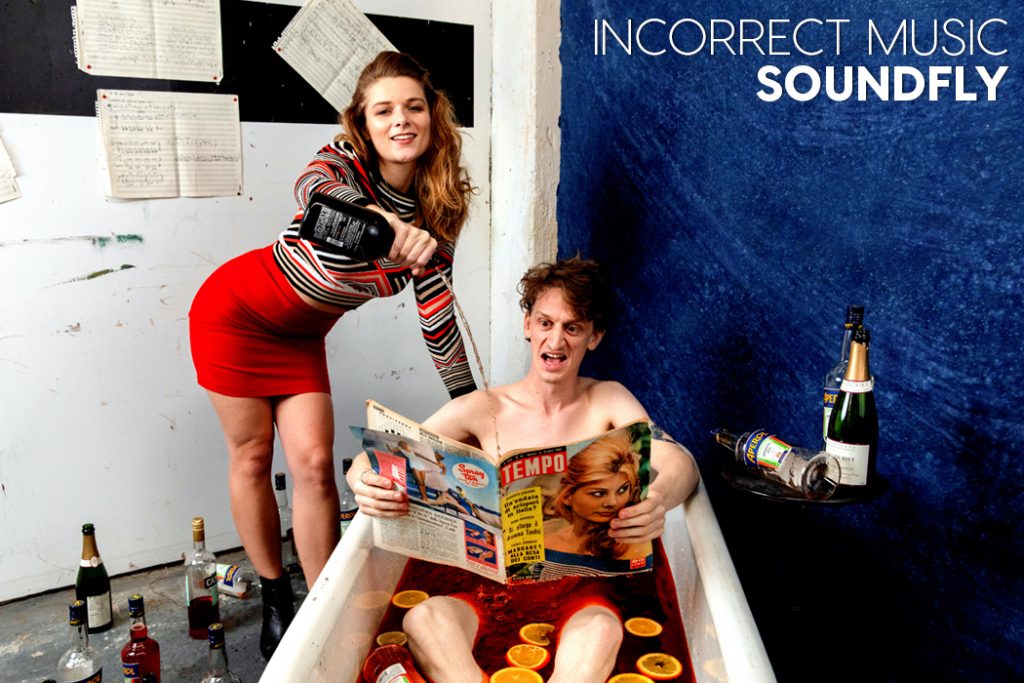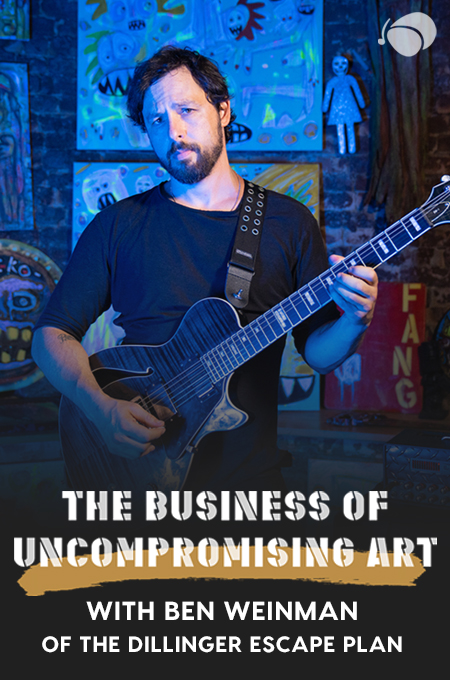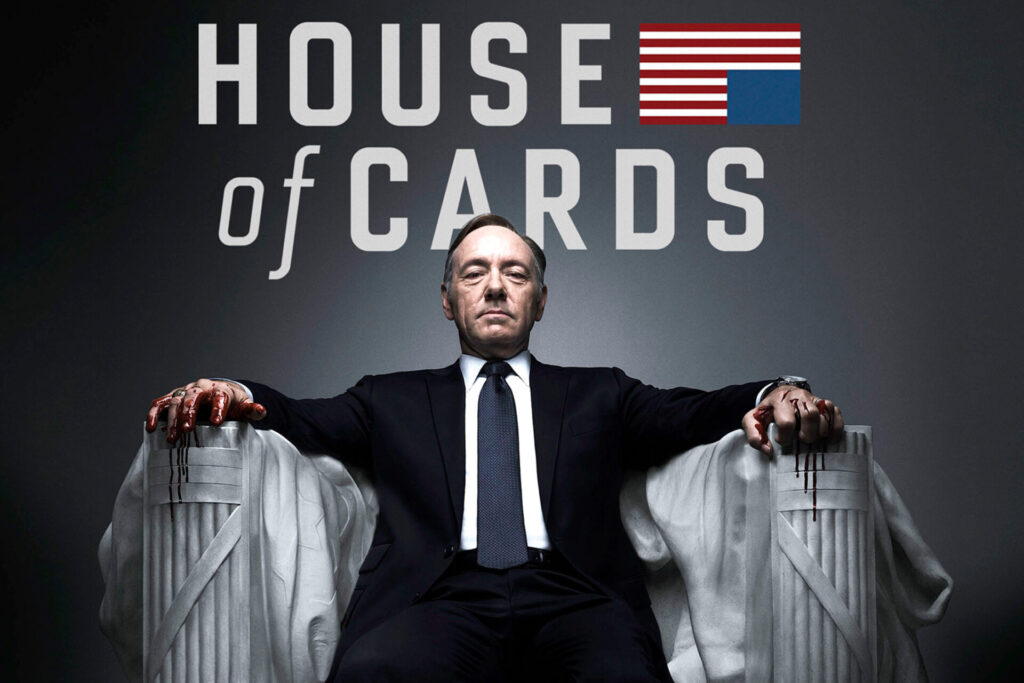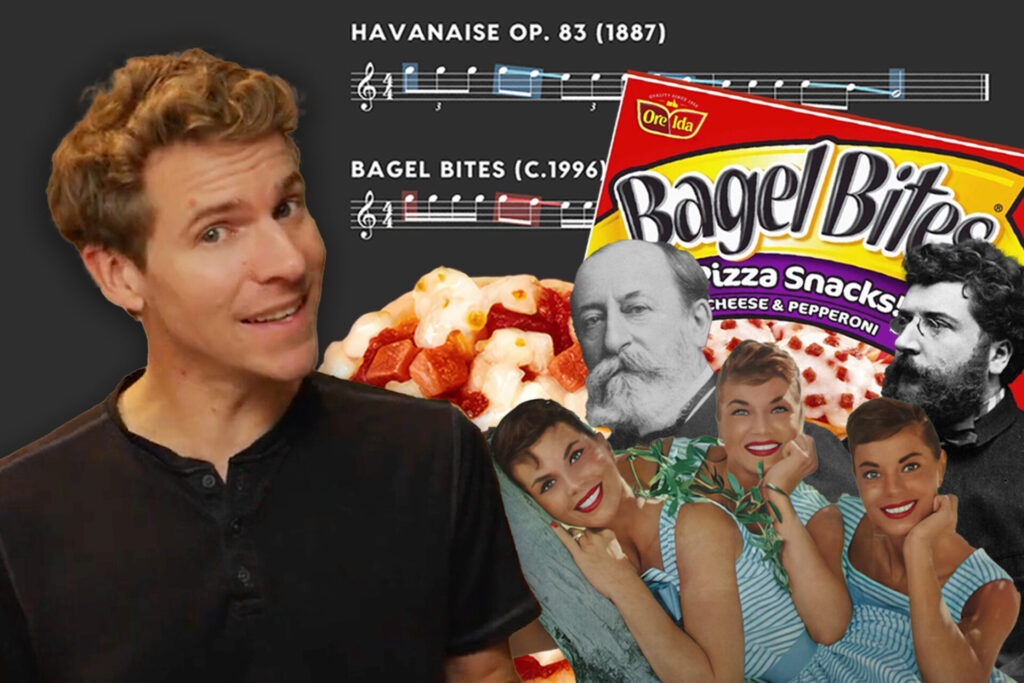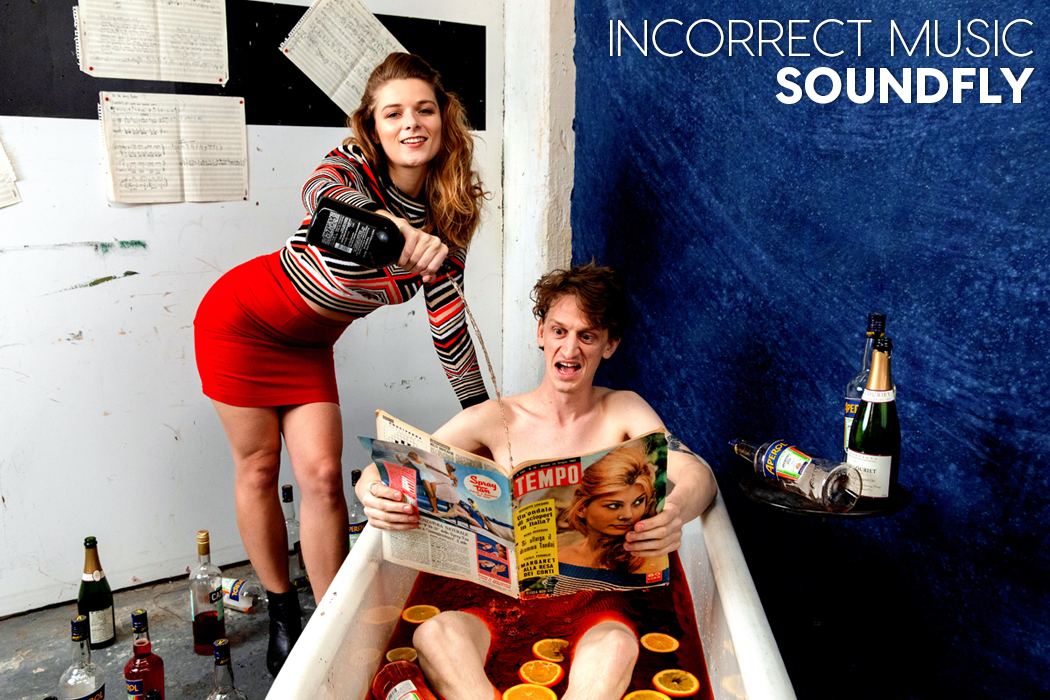
Welcome back to our interview series, Incorrect Music, curated by guitarist, singer, and composer Lora-Faye Åshuvud (of the band Arthur Moon). In this series, we present intimate conversations with artists who are striving to push the boundaries of their process and craft. Join our email newsletter to get more insights like this into how professional artists are making music and how you can apply those lessons to your own music.
Tredici Bacci’s latest record, La Fine Del Futuro, released this spring, makes me feel like I’m playing a minor character in a movie about falling in love on mushrooms in a European technicolor nightmare circus. And oh yes, it’s definitely set in the 1970s. Simon Hanes is this 13-piece soundtrack-pop ensemble’s fearless leader, as well as its composer and arranger. Flypaper’s Dre DiMura asked the California-raised Brooklyn-based musical polymath to speak about his sense of humor, which is integral to the music, and Hanes said something which I think encompasses a huge part of the ethos of this interview series:
“At the end of the day, being able to throw your hands up and laugh when a project goes horribly awry, or bringing an attitude of openness and humor onstage, can make space for very magical things to happen out of the blue, and that’s what I love most of all.
Me too. Those “magical things” that come from our being open to and joyful about our mistakes — those are the moments that make music like Tredici Bacci’s feel like such a gift. Both intricate and broad, both ridiculous and honest, both precise and full of human breadth and skew, La Fine Del Futuro is a triumph of Hanes’ philosophy about taking the art of laughing (at himself, and with others) to be the very serious business that it is.
Tredici Bacci’s new album, La Fine Del Futuro, is out now via NNA Tapes. And if you’re in New York City, Simon Hanes and Tredici Bacci will be presenting new work on June 26 at National Sawdust. More info here.
– Lora-Faye Åshuvud
Interview by Dre DiMura
How did your obsession with Italian culture start? Hanes is hardly an Italian name…
If only I could explain away my Italophilia so simply as just to say it runs in my blood; but I’m Ukranian-Jewish and German. The truth is that I have absolutely no idea how or why I’m so damn interested in that specific place and that specific time. I’ve tried to come up with a lot of reasons over the years, which have included everything from the permissive, freewheeling sexual attitudes of Europe in the late 1960s and early ’70s to the bizarre musical genres that Italian film composers blended — like pop, bossa nova, free-improvisation, contemporary ensemble music, and even cheesy world music cliches — to create this one strangely magnificent strew. But really, it isn’t one thing — it’s everything!
The instrumental use of voice reminded me of Edda Dell’Orso’s work with Ennio Morricone. How do you feel Morricone has influenced your work?
Morricone, Rota, Cipriani, Umiliani, Piccioni, Ortolani, Trovajoli: They’ve all influenced my work in countless ways, and not just in their shared collaboration with Edda Dell’Orso. Starting with Morricone and working my way down the line, I’ve tried to study the work of these composers as deeply as I can, and discover what it is about the kind of music they made which speaks to me on such a profound level.
To my memory, the first seed was planted in high school, when I climbed into my friend’s car (he was 18 and down to buy me smokes) and was immediately transported to a distant, unfamiliar desert landscape which I found surreal and intoxicating. Turns out he was listening to the soundtrack of The Good, The Bad, & The Ugly. Probably the next day I went to Amoeba Records and bought the CD and listened to it every day for months.
Four years later, I was on my first-ever DIY tour with the original lineup of band whose name I need not mention — it was a rough, January midwest tour… Cold and unforgiving. We maintained sanity by cancelling two of our Ohio shows and hanging out in Chicago for a week, where Borey Shin (composer and keyboardist extraordinaire) bought a Morricone soundtrack called Giornata Nera Per L’Ariete, and that drove the final nail into the coffin, so to speak. There was a Russian website at the time where you could pirate every Morricone soundtrack for free, so I started doing my homework.
I think the title, “La Fine Del Futuro” (“The End of the Future”) is apt because truly, we’re living in a post-modern era. How heavily do you allow technology to influence your composition? I read that you arranged the album by hand on manuscript paper.
My writing method isn’t so much about technology as it is about coming up with a process that works for me. We’re living in a climate of immediacy, which can often yield great results, but it isn’t particularly conducive to a rigorous vetting of concepts or ideas. That being said, I have absolutely zero attention span. Writing on manuscript paper with a pen is all about slowing the process down, focusing in, and running through the same ideas over, over and over — essentially beating my head against the wall to get the ideas out.
After a piece is fully composed, I turn to technology for the organization and administrative side of things: Making charts, organizing rehearsals, emailing harsh MIDI demos to everyone while simultaneously watching Columbo in the background.
The album is filled with so many glorious quotes and clichés (this is a high compliment). I never got tired of listening. With so many possibilities, how do you hone in on and develop your better ideas?
Some ideas come in like a flash and then disappear so fast that I don’t have a chance to engage with them; and other ideas stick around through thick and thin. The latter are the ones that tend to make it onto records. I’d been kicking around “In the 1970s” for about five years before I finally decided to bring it in to the band. Also I am very, very critical of myself (hooray!); not just with music, but with all things. It helps, most of the time!
“…underneath the faded canopy of the bland mainstream lies a multiverse of challenging, engaging, explorative, enlivening work which I would say is the real ‘music of now,’ and which I love deeply.”
What I like most about the project is the ability to celebrate the past, even going as far as to purport that “everything was better in the 1970s,” without actually feeling archaic or pretentious. What do you think about the music of today?
Hopefully Tredici Bacci’s listeners understand the inherent joke underlying a song about the ’70s written by someone who was born in 1991. Of course, I can’t seriously mourn an era that I mostly learned about from watching erotic films and talking to my parents’ friends. That said, most things that I love (in music, art, fashion and the aforementioned erotica) were made in the ’70s, and I wonder if I would have thrived had I been born back then. “In The 1970s” is more of a loving ode to what I admire about that decade, and as a compositional experiment, an attempt to write something that used my favorite “’70s-sounding” signifiers.
When it comes to music “now,” it all depends on who and what we’re talking about. The stuff that gets advertised on harshly illuminated screens down on L Train platforms? The bands involved in what that Pitchfork describes as “the most important stories in music?” Spotify Playlists for the gym? The Bang On a Can Allstars? Generally, I mistrust these things, because I don’t see them making any attempts to use music’s great power to snap people out of the general stupor of malaise that seems to be a symptom of living in our times.
Luckily for myself, and all the other people out there like me, underneath the faded canopy of the bland mainstream lies a multiverse of challenging, engaging, explorative, enlivening work which I would say is the real “music of now,” and which I love deeply. So many colleagues and collaborators here in New York, bands with whom Tredici Bacci has had the honor of sharing bills, the musicians that are out creating their own platforms of presentation (because thats the only way to ensure that their voice will be heard), I admire them all so much and am endlessly inspired by them.
When you compose, do you gravitate toward certain instruments? And how much of the composition is being orchestrated in your inner ear and how much of it are you playing while you write?
It’s an ever-fluctuating continuum. Sometimes an idea will pop into my head completely orchestrated and ready to be written down, and other times it’ll just be a little scrap — something I have to sit down and futz around with for hours before achieving any sense of clarity about what exactly I should do with it. Orchestration has always been my favorite part of the writing process, and I enjoy trying to figure it all out, digging and finding the information already hidden in a piece of musical material that will guide my decisions about how to treat it.
La Fine Del Futuro is diverse harmonically. How actively do you need to steer yourself away from familiar progressions and melodic lines? Or I guess, how do you keep your approach to harmony varied?
I’m happy you think it sounds varied! Of course, I’ve been freaking out for awhile about the exact opposite; when I listen I of course hear a lot of similar patterns, progressions and melodies, which worries me a bit. Ultimately, I try to maintain a sort of “been there, done that” mentality to writing new music, meaning that if I find myself venturing into too-familiar territory I look for ways to steer myself towards a new direction.
However, sometimes the music pours out too fast, or I have to cram a bunch of writing into a single night to meet some kind of deadline, then there’s less of an opportunity to analyze oneself and the only thing to do is trust that the little musical navigator will stop you from repeating yourself… Both methods are absolutely terrifying!
The video for “In the 1970’s” (above) is brilliant. Have you always felt free to incorporate humor into your work? I’m impressed when people have the courage not to take themselves too seriously.
First off, I have to shout out the director Zack Scott, as he deserves most of the credit there. Zack and I have been dear friends ever since high school, and when I came to him for help with that video, my ideas were very, very rough and unrealistic. He looked at the resources we had and came up with a great concept that was totally within reach, organized a crew of his friends in Austin, and even chipped in some money (no small amount, I might add!).
Both of the new videos were made against countless odds: “In the 1970s” because of all the impossible ideas we wanted to make real, and “Felicity” because we had to find a place to shoot all 15 Baccis at the same time with essentially no budget. Thankfully due to my employment at Roulette Intermedium in Brooklyn, I was able to get a day there to shoot, and Chris Shields, a filmmaker/writer/musician who I’ve admired for years, was completely instrumental in making that video work as well as it did, considering that we filmed it in six hours by the skin of our teeth. It was Chris’ natural eye for dynamism and lighting that made it look so amazing, as well as the insane post-production he did which made it look like an old VHS copy of an Italian movie. My dream came true!
As for taking oneself too seriously… If I wasn’t able to make fun of myself, especially considering what I’m trying to do with my life, I don’t think I’d be able to cope. That’s not to say I don’t take anything seriously, because that’s essential too. But at the end of the day, being able to throw your hands up and laugh when a project goes horribly awry, or bringing an attitude of openness and humor onstage, can make space for very magical things to happen out of the blue, and that’s what I love most of all.
Want to get all of Soundfly’s premium online courses for a low monthly cost?
Subscribe to get unlimited access to all of our course content, an invitation to join our members-only Slack community forum, exclusive perks from partner brands, and massive discounts on personalized mentor sessions for guided learning. Learn what you want, whenever you want, with total freedom.
